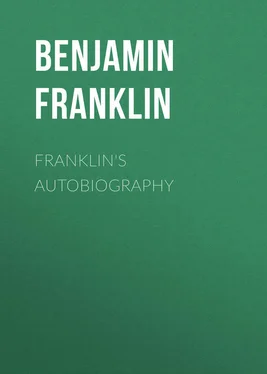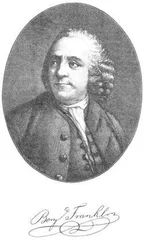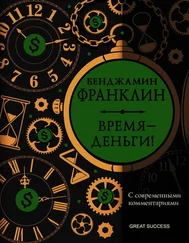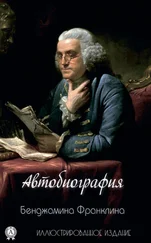Бенджамин Франклин - Franklin's Autobiography
Здесь есть возможность читать онлайн «Бенджамин Франклин - Franklin's Autobiography» — ознакомительный отрывок электронной книги совершенно бесплатно, а после прочтения отрывка купить полную версию. В некоторых случаях можно слушать аудио, скачать через торрент в формате fb2 и присутствует краткое содержание. Издательство: Иностранный паблик, Жанр: История, foreign_antique, foreign_prose, на английском языке. Описание произведения, (предисловие) а так же отзывы посетителей доступны на портале библиотеки ЛибКат.
- Название:Franklin's Autobiography
- Автор:
- Издательство:Иностранный паблик
- Жанр:
- Год:неизвестен
- ISBN:нет данных
- Рейтинг книги:3 / 5. Голосов: 1
-
Избранное:Добавить в избранное
- Отзывы:
-
Ваша оценка:
- 60
- 1
- 2
- 3
- 4
- 5
Franklin's Autobiography: краткое содержание, описание и аннотация
Предлагаем к чтению аннотацию, описание, краткое содержание или предисловие (зависит от того, что написал сам автор книги «Franklin's Autobiography»). Если вы не нашли необходимую информацию о книге — напишите в комментариях, мы постараемся отыскать её.
Franklin's Autobiography — читать онлайн ознакомительный отрывок
Ниже представлен текст книги, разбитый по страницам. Система сохранения места последней прочитанной страницы, позволяет с удобством читать онлайн бесплатно книгу «Franklin's Autobiography», без необходимости каждый раз заново искать на чём Вы остановились. Поставьте закладку, и сможете в любой момент перейти на страницу, на которой закончили чтение.
Интервал:
Закладка:
And after some time an ingenious tradesman, Mr. Matthew Adams, who had a pretty collection of books, and who frequented our printing house, took notice of me, invited me to his library, and very kindly lent me such books as I chose to read. I now took a fancy to poetry, and made some little pieces; my brother, thinking it might turn to account, encouraged me, and put me on composing occasional ballads. One was called "The Lighthouse Tragedy," and contained an account of the drowning of Captain Worthilake with his two daughters; the other was a sailor's song on the taking of Teach (or Blackbeard), the pirate. They were wretched stuff, in the Grub Street 28 28 A street in London in which many writers of small ability or reputation, or of unhappy fortune, had lodgings. "Grub Street style," therefore, means poor or worthless in literary value. The term, which always implied a sneer, was made current by Pope and Swift and their coterie.
ballad style; and when they were printed he sent me about the town to sell them. The first sold wonderfully, the event being recent, having made a great noise. This flattered my vanity; but my father discouraged me by ridiculing my performances and telling me verse makers were generally beggars. So I escaped being a poet, most probably a very bad one; but as prose writing has been of great use to me in the course of my life, and was a principal means of my advancement, I shall tell you how, in such a situation, I acquired what little ability I have in that way.
There was another bookish lad in the town, John Collins by name, with whom I was intimately acquainted. We sometimes disputed, and very fond we were of argument and very desirous of confuting each other; which disputatious turn, by the way, is apt to become a very bad habit, [n] Конец ознакомительного фрагмента. Текст предоставлен ООО «ЛитРес». Прочитайте эту книгу целиком, купив полную легальную версию на ЛитРес. Безопасно оплатить книгу можно банковской картой Visa, MasterCard, Maestro, со счета мобильного телефона, с платежного терминала, в салоне МТС или Связной, через PayPal, WebMoney, Яндекс.Деньги, QIWI Кошелек, бонусными картами или другим удобным Вам способом.
making people often extremely disagreeable in company by the contradiction that is necessary to bring it into practice; and thence, besides souring and spoiling the conversation, is productive of disgusts and perhaps enmities where you may have occasion for friendship. I had caught it by reading my father's books of dispute about religion. Persons of good sense, I have since observed, seldom fall into it, except lawyers, university men, and men of all sorts that have been bred at Edinburgh.
A question was once, somehow or other, started between Collins and me, of the propriety of educating the female sex in learning, and their abilities for study. He was of opinion that it was improper, and that they were naturally unequal to it. I took the contrary side, perhaps a little for dispute's sake. He was naturally more eloquent, had a ready plenty of words, and sometimes, as I thought, bore me down more by his fluency than by the strength of his reasons. As we parted without settling the point, and were not to see each other again for some time, I sat down to put my arguments in writing, which I copied fair and sent to him. He answered, and I replied. Three or four letters of a side had passed, when my father happened to find my papers and read them. Without entering into the discussion, he took occasion to talk to me about the manner of my writing. He observed that, though I had the advantage of my antagonist in correct spelling and pointing (which I owed to the printing house), I fell far short in elegance of expression, in method, and in perspicuity, of which he convinced me by several instances. I saw the justice of his remarks, and thence grew more attentive to the manner in writing, and determined to endeavor at improvement.
About this time I met with an odd volume of the "Spectator." 29 29 A paper published in London every week day from the 1st of March, 1711, to the 6th of December, 1712, and made up for the most part of essays by Addison, Steele, and their friends. It held aloof from politics, and dealt with the manners of the time and with literature.
It was the third. I had never before seen any of them. I bought it, read it over and over, and was much delighted with it. I thought the writing excellent, and wished, if possible, to imitate it. With this view, I took some of the papers, and, making short hints of the sentiment in each sentence, laid them by a few days, and then, without looking at the book, tried to complete the papers again, by expressing each hinted sentiment at length, and as fully as it had been expressed before, in any suitable words that should come to hand. Then I compared my "Spectator" with the original, discovered some of my faults, and corrected them. But I found I wanted a stock of words, or a readiness in recollecting and using them, which I thought I should have acquired before that time if I had gone on making verses; since the continual occasion for words of the same import, but of different length to suit the measure, or of different sound for the rhyme, would have laid me under a constant necessity of searching for variety, and also have tended to fix that variety in my mind and make me master of it. Therefore I took some of the tales and turned them into verse; and, after a time, when I had pretty well forgotten the prose, turned them back again. I also sometimes jumbled my collections of hints into confusion, and after some weeks endeavored to reduce them into the best order before I began to form the full sentences and complete the paper. This was to teach me method in the arrangement of thoughts. By comparing my work afterward with the original, I discovered many faults and amended them; but I sometimes had the pleasure of fancying that in certain particulars of small import I had been lucky enough to improve the method or the language, and this encouraged me to think I might possibly in time come to be a tolerable English writer, of which I was extremely ambitious. My time for these exercises and for reading was at night after work, or before it began in the morning, or on Sundays, when I contrived to be in the printing house alone, evading as much as I could the common attendance on public worship, which my father used to exact of me when I was under his care, and which indeed I still thought a duty, though I could not, as it seemed to me, afford time to practice it.
When about sixteen years of age I happened to meet with a book, written by one Tryon, recommending a vegetable diet. I determined to go into it. My brother, being yet unmarried, did not keep house, but boarded himself and his apprentices in another family. My refusal to eat flesh occasioned an inconveniency, and I was frequently chid for my singularity. I made myself acquainted with Tryon's manner of preparing some of his dishes, such as boiling potatoes or rice, making hasty pudding, and a few others, and then proposed to my brother that if he would give me weekly half the money he paid for my board I would board myself. He instantly agreed to it, and I presently found that I could save half what he paid me. This was an additional fund for buying books. But I had another advantage in it. My brother and the rest going from the printing house to their meals, I remained there alone, and, dispatching presently my light repast, which often was no more than a biscuit or a slice of bread, a handful of raisins, or a tart from the pastry cook's, and a glass of water, had the rest of the time till their return for study, in which I made the greater progress from that greater clearness of head and quicker apprehension which usually attend temperance in eating and drinking.
Читать дальшеИнтервал:
Закладка:
Похожие книги на «Franklin's Autobiography»
Представляем Вашему вниманию похожие книги на «Franklin's Autobiography» списком для выбора. Мы отобрали схожую по названию и смыслу литературу в надежде предоставить читателям больше вариантов отыскать новые, интересные, ещё непрочитанные произведения.
Обсуждение, отзывы о книге «Franklin's Autobiography» и просто собственные мнения читателей. Оставьте ваши комментарии, напишите, что Вы думаете о произведении, его смысле или главных героях. Укажите что конкретно понравилось, а что нет, и почему Вы так считаете.





![Бенджамин Франклин - Время – деньги. Автобиография [litres]](/books/397995/bendzhamin-franklin-vremya-dengi-avtobiografiya-thumb.webp)




